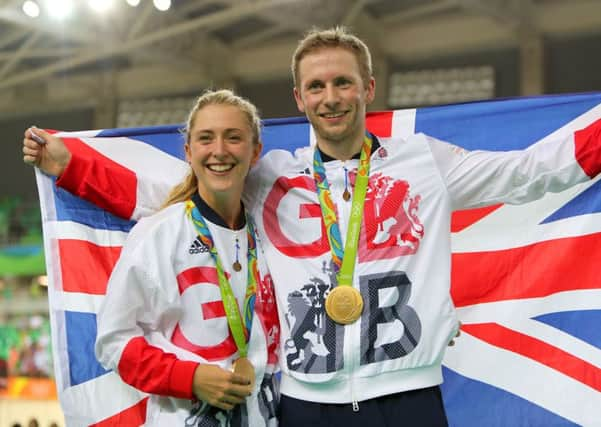Tom Richmond: The band of gold '“ our new generation of Olympic giants


That’s right. This country’s 50th medal, beating the 47 secured in Beijing eight years ago and leaving this team of unassuming record-breakers on course to match the 65 podium finishes at London 2012. So much for the slump which traditionally follows a home Olympics (take note Australia and China).
It was best summed up by Pudsey gymnast Nile Wilson’s near-speechless father Neil after he had watched his son become the first Briton in history to medal on the horizontal high bar. “I don’t know what the words are,” the proud-as-punch dad declared on national radio.
Advertisement
Hide AdAdvertisement
Hide AdOn yet another inspirational night for British sport which will forever be remembered for newlyweds-to-be (Sir) Jason Kenny and (Dame) Laura Trott, the first couple of cycling, taking their personal gold medal tally to 10 after riding the roller-coaster of emotion in the velodrome, the secret behind Team GB’s success finally emerged – the humility and down-to-earthness of this golden generation of people’s champions.
Yes, these successes would not be possible without the much maligned Sir John Major having the foresight to create the National Lottery to transform the funding of sport after the embarrassment of Atlanta 20 years ago when Britain brought home a solitary gold. They’re also due, in no small part, to the emergence of world-class coaches who realise that the word ‘team’ is the most important of all when it comes to 21st century elite sport – whether it is an individual event or not.
But this sporting samba is also due to the humbleness of Team GB’s standard-bearers. Unlike England’s so-called ‘golden generation’ of over-paid, under-performing, prima donna, Bentley-driving multi-millionaire footballers who find it such a chore to play on the international stage – and then freeze on the spot when playing the might of Iceland – these champions are proud to represent their community and country.
From their gracious interviews, when they have gone out of their way to credit the Lottery, coaches and family, to the sportsmanship shown when double gold medallist Max Whitlock shook the hands of his defeated rivals before climbing to the top of the podium for the proudest two moments of his life, these are individuals with their feet firmly on terra firma – except when they’re twisting and turning through the air with breathtaking beauty and brilliance.
Advertisement
Hide AdAdvertisement
Hide AdAfter all, the aforementioned Nile Wilson and his father were the first to credit the importance of pioneers like Beth Tweddle and Louis Smith whose gymnastics success was the springboard to an unprecedented seven medals in a sport in which Britain had little pedigree – until now. Now it has the potential to be the new cycling.
It’s the same with Laura Trott who spent the early weeks of her life on a ventilator after being born prematurely – this waif-like figure (and asthmatic) was inspired to take cycling more seriously when she met Bradley Wiggins after his success at the 2004 Olympics in Athens. That treasured photo, and memory, is her inspiration. “It felt amazing,” she said. “I still have that picture of me and Sir Brad from when I was little and he let me wear his Olympic medal.”
Now youngsters will be looking up to the tearful Trott and her fiancée Jason Kenny who intends to celebrate his great deeds – his career record is now equal that of his hero Sir Chris Hoy – by taking his dogs for a walk. He’s so low-profile that his personal website is bereft of commercial endorsements in case their demands get in the way of what he does best – riding a bike.
And then there’s jumping Jack Laugher who added springboard silver to the synchro gold that he won with his back-from-the-dead house-mate and best friend Chris Mears. He is among those competitors to have been blessed by the presence in the Olympic village of tennis titan Andy Murray – arguably Britain’s greatest sportsman – after the dual Wimbledon winner (and now two-time gold medal winner) eschewed a luxury hotel to spend every spare minute inspiring younger team-mates.
Advertisement
Hide AdAdvertisement
Hide AdLaugher intends to celebrate his medals by catching the Number 36 bus from Ripon, where he grew up, to Harrogate where he was born and on to Leeds where he trains. The 21-year-old said with palpable pride: “The bus goes from Ripon through Harrogate to Leeds, which is kind of my life story. It really touched me, that was really nice to hear. I know everyone’s so proud of me back home but I’m just a normal kid from Yorkshire. This is my job and I love it every single day. Nothing’s going to change.”
It’s a refreshing attitude which sums up Team GB – and all those medal-winners from Yorkshire, and the rest of the UK, who came to the fore on the night of August 16, 2016, when the BBC had to rip up its schedules to accommodate the once Cinderella sports of gymnastics, cycling and diving.
Role models rather than celebrities, it is the humility and quiet determination of this particular ‘golden generation’ which now represents the best of sport – and the very best of Britain. Long may this be the case so their example can be used to persuade the powers-that-be to invest in grassroots facilities and create an even greater sporting legacy.